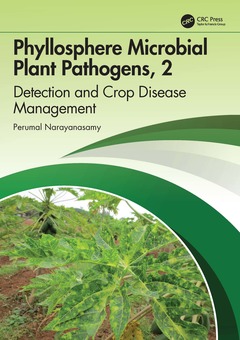Description
Phyllosphere Microbial Plant Pathogens: Detection and Crop Disease Management
Volume 2 Management of Crop Diseases
Author: Narayanasamy P.
Language: English
Subjects for Phyllosphere Microbial Plant Pathogens: Detection and...:
· 21x28 cm · Hardback
Description
/li>Contents
/li>Readership
/li>Biography
/li>
This book provides comprehensive knowledge of the methods of detection and identification of phyllosphere microbial pathogens and the management of different kinds of diseases caused by them in various crops. Interactions between pathogens and host plants result in the induction of defense responses expressed via molecular signals, from initiation of infection to systemic progression of pathogen invasion in susceptible plants and contrasting signals in resistant plants, leading to inhibition of pathogen development through activation of preinfectional and postinfectional defense responses. These are critically discussed.
The author describes the intricate and complex competitive activities of the pathogens and host plants in a molecular warfare that the host plant must win to break the link in the pathogens' life cycle, allowing the development of disease management strategies based on the principles of exclusion, eradication, and immunization. Integration of strategies concerning the development of cultivars resistant to pathogens through breeding and biotechnological techniques, application of biotic and abiotic inducers of resistance to pathogens, and use of disease-free seeds and propagules that are complementary to each other along with effective cultural practices are emphasized.
This book presents information gathered through an extensive literature search to help the researchers and graduate students in agricultural sciences identify research gaps and successfully complete their research projects.
1 Methods of Exclusion of Pathogen Inoculum and Reduction of Disease Incidence
2 Resistance of Crops to Phyllosphere Microbial Pathogens
3 Biological Management of Crop Diseases
4 Crop Disease Management through Chemicals
5 Crop Disease Management through Integration of Management Strategies
Prof. P. Narayanasamy was awarded the BSc (Ag.) (1958), MSc (Ag.) (1960), and PhD (1963) degrees by the University of Madras, and later with the Rockefeller Foundation Fellowship, he pursued postdoctoral research on rice virus diseases at the International Rice Research Institute, Philippines during 1966–1967. He served as the virus pathologist at the Indian Agricultural Research Institute, New Delhi, during 1969–1970. He returned to his alma mater, which was upgraded as the Tamil Nadu Agricultural University (TNAU), Coimbatore, in 1970. He was appointed associate professor and then promoted to professor and head of the Department of Plant Pathology. He was elected a fellow of Indian Phytopathological Society, New Delhi. He functioned as the editor of the Madras Agricultural Journal published from the Tamil Nadu Agricultural University Campus and a member of editorial committees of the plant pathology journals published in India. He was invited to participate as the lead speaker and chairman of sessions in the national seminars held in India.
As a researcher in plant pathology, he was the leader of projects on diseases of rice, legumes, and oilseeds. He organized the National Seminar for the Management of Diseases of Oilseed Crops. His research on antiviral principles yielded practical solutions for the management of virus diseases affecting various crops. He published over 250 research papers in national and international journals. He was the principal investigator of several research projects funded by the Department of Science and Technology, Government of India, New Delhi, and the International Crops Research Institute for Semi-Arid Tropics, Hyderabad, India. He continues to share his experience and knowledge with the staff and graduate students of the Department of Plant Pathology, TNAU, Coimbatore. As a teacher, he taught courses on plant virology, molecular biology, physiopathology, and crop disease management for master's and doctor




